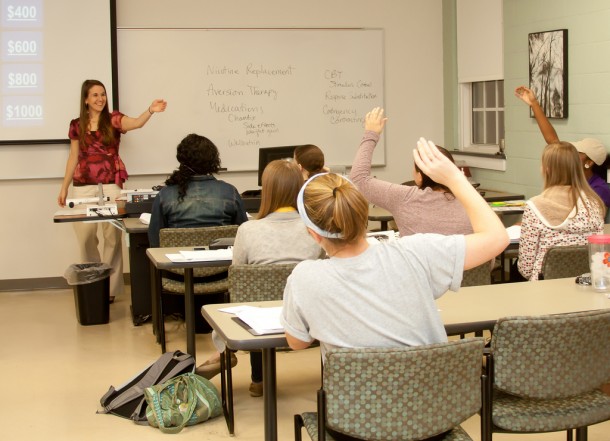It is rare for GCSE English lessons on poetry to inspire great excitement from an entire class, regardless of the ability level. In the minds of teenagers, poetry tends to be seen as complicated, difficult to understand, and needlessly complex.
During primary school, poetry has much more of a focus on elements such as rhythm and rhyme, and for younger children the sound of poetry is particularly enjoyable. In fact, most poetry at primary level is not announced as such, and instead young children are introduced to it through the medium of nursery rhymes, playground songs, and well known verse. It is not until it is formally called poetry, presented in an anthology, and demanded to be analysed, that this aversion to poetry comes about.
The issue of studying for exams and not for increased knowledge is one that is relative to most subject areas, however with English there is a greater sense of the exam that removes the enjoyment from both poetry and novels. When reading set texts or anthologies, there is always the looming prospect of the exam. There is never really the chance to enjoy literature for what it is, without the constant threat of forgetting terminology such as enjambment and mixing up your Petrarchan sonnet from your Shakespearean sonnet.
The prospect of a closed book exam for poetry inspires even more dread in students. The thought of having to go into an exam hall and conjure from your mind lines of poetry, and then analyse them, is horrific. This results in students panicking and spending all of their time intently learning by heart masses of poetry, without stopping to consider any of the emotional effect of what they’re reading, or simply appreciating the thoughts that it inspires in them. Often students can read twenty of a famous poet’s work without ever actually reading it, because they are so intent on learning the lines for the exam. While it’s impressive to have a few lines of poetry that you can recite on command, memorising whole poems is not a natural way of reading and appreciating poetry, and it often removes all the enjoyment from the task.
As in Dead Poets Society, poetry lessons have become that exactly: a way of ‘learning’ poetry when it is in fact something that cannot be learnt. An almost scientific technique is applied to ensure that every syllable of a poem is analysed and annotated, when really poetry should be read for meaning and enjoyment before any heavy analysis is made of it. The GCSE poetry anthologies do not help with this. While they may contain a few poetic gems, the poems chosen for the anthologies are generally those that have the maximum potential for analysis and therefore not always the maximum potential for enjoyment. While a poem may contain enjambment, plosives and a good amount of sibilance, it may not actually be a poem that grabs you emotionally and makes you think. While this is good for the impending exam, as you have lots of material to write about, in later life it may distort people’s opinions of poetry, and leave them thinking that there is nothing that interests them.
However, there is an alternative to inspire a love of poetry through education. Cliff Yates is a pioneer in the teaching of poetry. He is a poet himself, has taught at various schools including Skelmersdale’s Maharishi school, and has written handbooks on the teaching of poetry in schools. Yates is an advocate of encouraging students to write their own poetry, something that most syllabuses are bereft of, and has various techniques for enabling students to do this. These include writing nonstop for five minutes, and he does not require that when the poem is finished that it is shown to anyone. This is a wonderful thing for a group of nervous teenagers who are perhaps writing down their feelings for the first time, and would find it horrifying to have them read by anyone else. Yates’ teaching methods stand out from the way that poetry is normally taught, and demonstrate an understanding of how children and young people learn.
The way that children first encounter poetry should be changed. A lesson plan entitled ‘poetry’ should not inspire fear or boredom in a class. Taking an hour to look at a poem that may not be on the exam, but that may encourage students to look at poetry with a more open mind will not damage exam results, and could potentially help students to work towards the exam with more excitement.
Sadly, the teaching of poetry in schools leaves some people with a feeling of boredom, meaning they never touch a poem again. There are ways that this can be changed, and it should be happening now. Often all it takes to get someone interested in poetry is one poem that really speaks to them, and by only giving a class a GCSE anthology to work with, the chance of them finding that one poem is slim. As Philip Larkin replied in an interview with Paris Review, when asked about his ‘study’ of various poets: ‘Oh, for Christ’s sake, one doesn’t study poets! You read them, and think, That’s marvellous, how is it done, could I do it? and that’s how you learn.’


